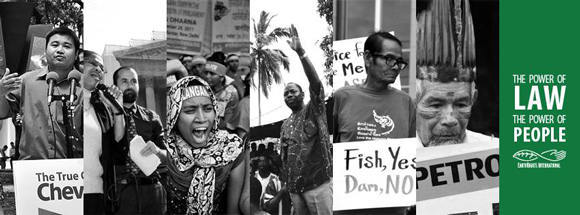In true David and Goliath fashion, human & environmental rights organization EarthRights International takes on corporate human rights abusers in the arena of public opinion by crowdfunding a documentary film series & training curricula that will empower activists in their pursuit of justice.
“John Steinbeck was my hero,” said Katie Redford, EarthRights International’s Co-founder and Director. His works, like The Grapes of Wrath, exposed her to “the underbelly of the American dream” and inspired Katie to pursue a legal career as a means of seeking justice.
After completing her undergraduate studies and before heading to University of Virginia’s School of Law, she spent two years teaching English in the town of Mae Sot, Thailand, situated by the border shared with eastern Burma.
She lived among and worked with refugees – men, women, and children who’d been displaced by or suffered from human rights abuses – who became her friends. Before she returned to the U.S., they told her, “You’re going back to the greatest democracy in the world.”
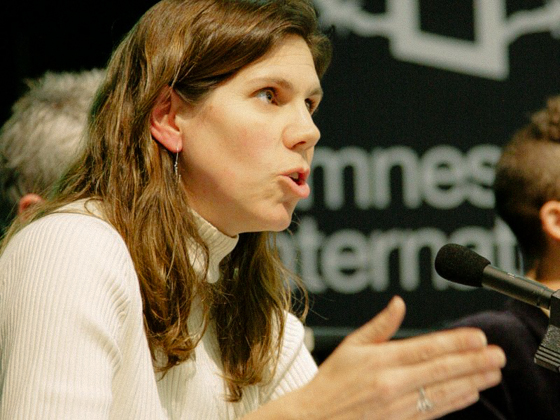
“Please use your freedom to help us get ours,” Katie’s friends said.
But “being a lawyer is not what I thought it was,” she said. “At the time, UVA had the only human rights program,” said Katie, yet she found herself swimming upstream among classmates vying for positions at prestigious white-shoe law firms in New York and Washington.
Thanks to her experience in Thailand, however, she stayed her course. After graduating, she returned to Thailand, where she co-founded EarthRights International (ERI).
ERI defends human rights and environmental rights, which the nonprofit organization defines as “earth rights”, using the power of law and the power of people.
ERI’s accomplishes their mission by:
- Documenting & exposing human rights and environmental abuses;
- Organizing & rallying human rights and environmental activists;
- Litigating on behalf of survivors of human rights abuses in U.S. courts;
- Educating people & training activists of their earth rights and remedies; and
- Advocating for survivors and the defense of earth rights.
Much of ERI’s legal work is based on the Alien Tort Claims Act (ATCA), which allows foreign nationals to seek redress before the U.S. justice system for human rights violations that have occurred outside the U.S.. For example, in Doe v. Unocal, Burmese villagers sued the Union Oil Company of California (Unocal) for human rights violations, such as forced labor and wrongful death, related to Unocal’s pipeline project in Burma.
These kind of lawsuits would be examples of “impact litigation”, the practice of filing lawsuits to effect broad change in laws and policies in addition to seeking remedies for the plaintiffs.
But not all impact litigation results in positive change. In Citizens United v. Federal Election Commission, the U.S. Supreme Court ruled that parts of the Bipartisan Campaign Reform Act (BCRA, also known as the McCain-Feingold Act) were unconstitutional.

That is, money was likened to free speech, thus limitations on how it’s spent were interpreted as restricting free speech rights, which is unconstitutional. As Katie explained the repercussions of the ruling, she sounded incredulous.
“They don’t have mouths, they’re not people,” she said. “The concept of corporate personhood [has gotten] out of control.”
With caps on corporate political spending lifted, fewer safeguards exist to curb undue corporate influence on government. So the battle for earth rights is fought not only in the court of law, but also in the “court of public opinion,” Katie said. “We all need to hold them accountable.”
It wasn’t enough to reveal the truth of corporate human rights abuses in the courtroom; it was time to expose the truth to the world. Recognizing the power of media, ERI set out to produce a series of short films and training curricula.
EarthRight’s Nonprofit Crowdfunding Campaign
Thus their fundraising campaign was born.
But this campaign had to be done differently. “Over 90% [of our funding] comes from foundations, [and] larger grants,” Katie shared. Donations ranging from $5,000 to $10,000 have come from a few individuals.
These films are meant “to amplify [their] voices, and give them a platform,” said Katie, referring to the victims and survivors of human rights abuses caused by corporations. The purpose of the campaign, then, is “to raise the voices of the ‘little’ people.”
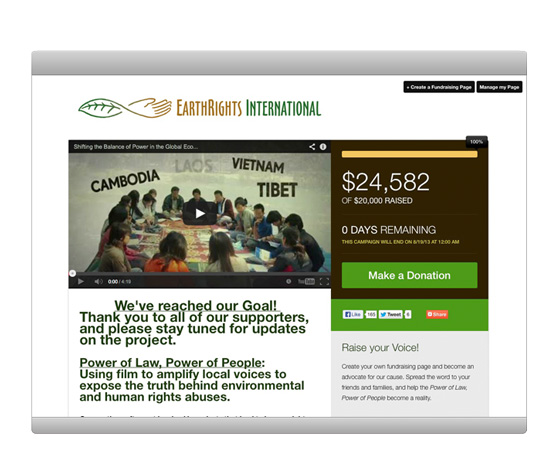
Accordingly, “this campaign needs to be funded by the people,” she said. In architecture, form follows function, that is to say that a building’s purpose will determine its structure. Likewise, the method of fundraising “should mirror the cause being championed.”
To tackle corporate human rights abusers, with their Goliath-sized public relations budgets, Katie envisioned “a lot of Davids” rallying behind this campaign. This made crowdfunding the most fitting approach for the campaign.
After extensively researching crowdfunding options that would best meet their needs, ERI chose CauseVox.
“It offered us a bit more control over the design of our page than some of the other platforms we looked at,” said Patrick Boyle, ERI’s Development Associate. “We also liked the way the ‘fundraiser’ options were laid out, and how it offered flexibility for our staff.”
Not only was the overall crowdfunding campaign page customizable, staff members were able to “tailor their pages and appeals to their own individual networks, and to tell their own stories about their work,” he said.
Patrick attributed some of the campaign’s success to the ability to customize each individual fundraiser’s page; the personalized appeals were most visitors’ introduction to EarthRights. These visitors were first-donors.
The campaign began July 19, 2013, and the initial goal was set at $15,000. As staff participation increased, ERI bumped the goal to $20,000.
“We had such positive results and such a warm response from our outreach that towards the end of the campaign we decided to make one last push to a broader swath of contacts that had not been part of our original outreach,” Patrick said. They increased the goal one more time to $25,000 as a way to encourage new participants.
The campaign concluded August 21, 2013; by the numbers as of August 23, 2013:
- Number of fundraisers (those who created fundraising pages): 10
- Number of donors: 192
- Total raised: $24,532
- Average donation: $127
- Range of donations: $5-$2,000
Not too shabby for a first attempt at crowdfunding.
Supporter-driven Fundraising
With much of ERI’s work being done and the staff being based in Southeast Asia, a few of the staff incorporated a pseudo-national past time into their crowdfunding efforts: Karaoke. Those who donated were able to select a song for the fundraiser to sing; the fundraiser would film himself singing said song and share for the donors’ viewing & listening pleasure.
Given the last-minute nature of the crowdfunding campaign’s inception and the novelty of peer-to-peer fundraising to the ERI community, a fun incentive made the process easier for everyone.
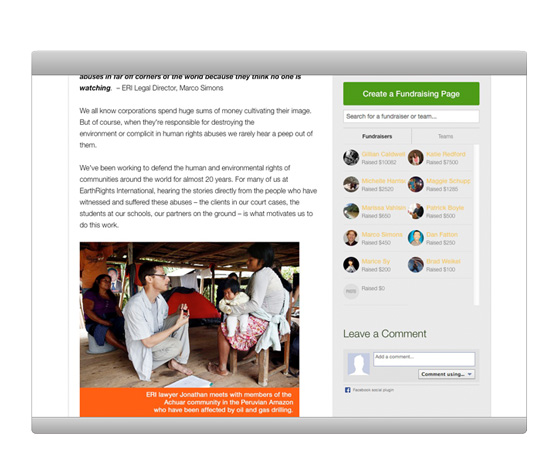
“I think having something silly to trade to your donors eased some of the anxiety of asking friends and family for money,” said Patrick. “And maybe replaced it with the performance anxiety that comes with performing on stage.”
However, karaoke wasn’t a part of the top fundraiser’s strategy. In lieu of giving her presents, Gillian Caldwell asked friends and family to celebrate her birthday by donating to ERI’s campaign. Like Katie, Gillian is also a human rights lawyer, and had served as an executive director of a human rights organization.
Gillian headed Witness, an organization that uses film & video to advocate for human rights. And by the end of July, she and her family had already arrived in Chiang Mai, Thailand, where she and her partner Louis have already begun work on the film portion of the project.
It’s challenging to find filmmakers who are skilled in making human rights films, Katie said. And that Gillian, an experienced human rights film producer, offered her service at a discounted rate compounds the impact of the funds that were raised.
Thanks to Gillian’s friends and family, she raised over $10,000; the cushion of funds raised over the $20,000 to complete the film & training materials affords ERI flexibility should any additional costs or needs spring up.
Lessons Learned
ERI learned a few lessons from their first foray into crowdfunding. Not every future fundraising endeavor will be a crowdfunding campaign, but they know now that they’ll set aside more time to plan and roll-out their next one.
They’ll spend the time training and acclimating themselves to this form of fundraising, and schedule the campaign strategically (read: not during peak vacation season), Katie noted. She also observed that successful campaigns are personal, and reaching out to one’s network on an individual basis requires time.
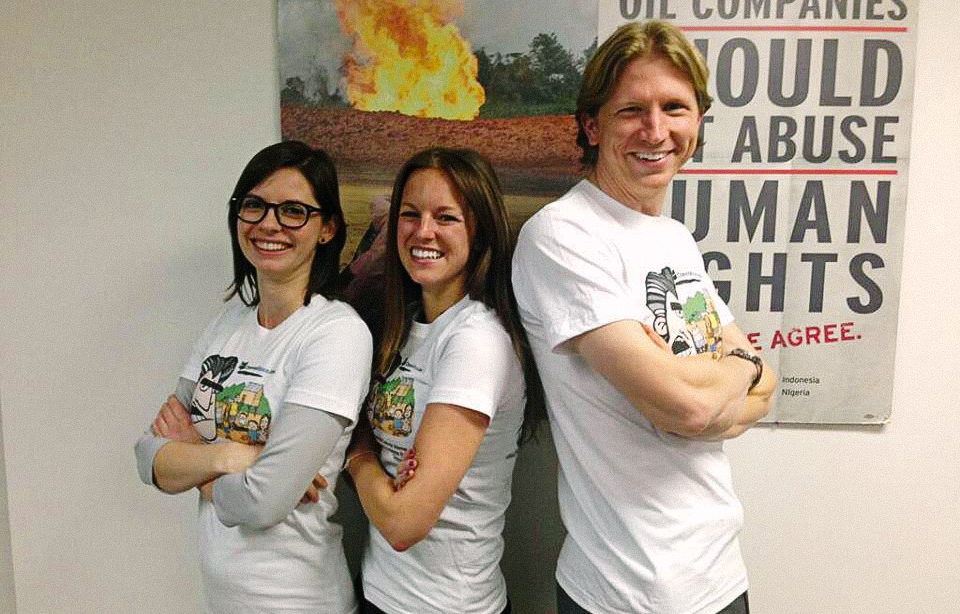
With this experience acting as a diving board, future campaigns will be even more successful. Katie hadn’t known what to expect and was pleasantly surprised by the experience.
“Gosh, most people weren’t annoyed,” she said. “They were excited, thankful,” to be a part of the campaign. The responses to crowdfunding the project were affirming, too; Katie had been told, “I’m so glad you didn’t fund this with a large grant.”
Patrick may choose a different kind of incentive. “Now that I actually have to film myself singing karaoke tunes, I think I would have picked a different gift!” he said.
Funding impact
With this project, donors get to see “something concrete,” said Katie, noting that it’s less so with the impact litigation ERI does.
ERI partners with the Mekong Legal Network to provide legal and technical support as well as facilitating an annual professional development conference. Through this partnership, they’ve identified “rabble rouser” lawyers in the Mekong River countries whom the film series and training curricula will largely benefit.
The curricula will provide these firebrand attorneys insights into successful casework strategy. In addition to empowering earth rights lawyers and encouraging activists, the short film series will be made accessible to the public, and won’t require a legal degree to understand.
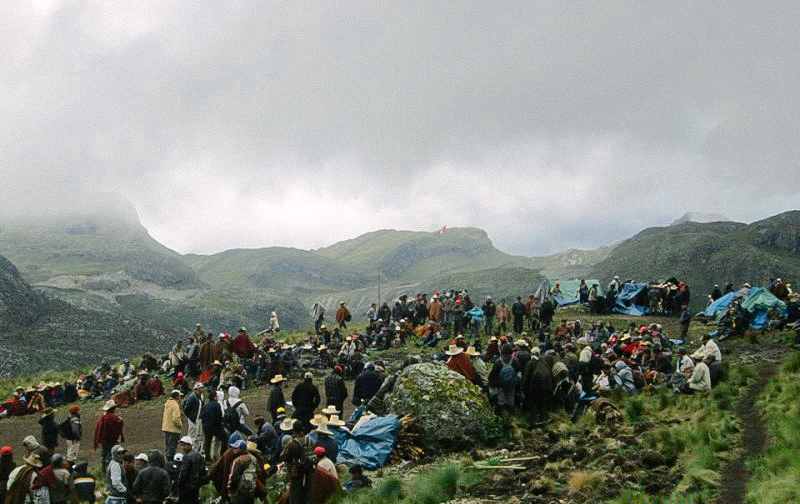
Human rights abuse survivors take real risks in telling their stories, said Katie. But these stories offer hope. Through their storytelling, survivors are not only reclaiming their rights but they’re also changing global policy.
Through this project, ERI seeks to expand and multiply the ripple effect of collecting the people’s voices and amplifying them. Corporate human rights violators make formidable opponents in the fight for justice but they’re not invincible.
The dream is that this film series and curricula be among ERI’s collection of stones to knock down their public relations shields and expose the truth to the world:
“We’re not as powerless as we think,” said Katie.
